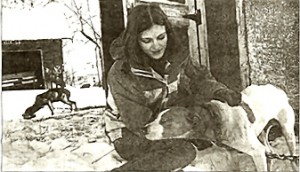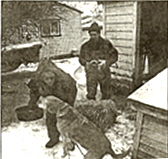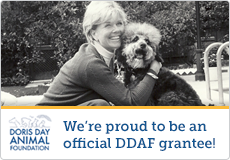| The Daily Oakland PressJan 30, 2005Volunteers Take the Time to Care for Oakland’s Neglected Animals
By Ann Zaniewski
Of The Daily Oakland Press
PONTIAC – It was so cold that a slight breeze stung like a slap on the face.
 Sammie, an old golden retriever mix with a short, reddish coat, spent that mid-January day, when temperatures dipped to 1 degree below zero, on a chain near a drafty garage and stepping in his own feces. Sammie, an old golden retriever mix with a short, reddish coat, spent that mid-January day, when temperatures dipped to 1 degree below zero, on a chain near a drafty garage and stepping in his own feces.
Across the city, a frozen wall of ice was molded to Luke’s tipped water dish. Although the friendly pit bull has a plastic doghouse, it looked as if he were taking shelter under a cracked, raised concrete slab of a driveway.
Tails wagging furiously, both dogs danced with happiness when volunteers from the Animal Care Network arrived with food, water and straw.
 Michigan Humane Society’s Animal Cops – a team that investigates complaints of abuse and neglect in Detroit, Hamtramck and Highland Park – garnered national attention when the cable channel Animal Planet began broadcasting their adventures in 2002. In Oakland County, the job of helping neglected animals on site falls to local or county animal control officers. Other than the officers, who are often busy with growing caseloads, the Animal Care Network is the only group in the county that helps by visiting animals in their own back yards. Michigan Humane Society’s Animal Cops – a team that investigates complaints of abuse and neglect in Detroit, Hamtramck and Highland Park – garnered national attention when the cable channel Animal Planet began broadcasting their adventures in 2002. In Oakland County, the job of helping neglected animals on site falls to local or county animal control officers. Other than the officers, who are often busy with growing caseloads, the Animal Care Network is the only group in the county that helps by visiting animals in their own back yards.
“My concern is, if it’s not us, who?” network president Marie Skladd said. “Do we just leave them all out there to suffer and die? I cannot do that.”
Hard work
No matter the weather, Animal Care Network volunteers go out an average of three times a week with a bucket of food, a jug of fresh water, collars, new chains, houses for dogs without them and rawhide chews loaded in the back of a rented Ryder truck. The group, which operates in Pontiac and Inkster, brings bales of straw to insulate doghouses and provide soft beds.
The network, a branch of the larger Michigan Animal Adoption Network, also places unwanted animals in new, caring homes. It conducts vaccination clinics, offers low-cost spaying and neutering programs, and checks abandoned houses for abandoned animals.
Skladd said almost all of the network’s 35 volunteers have been bitten at least once. But most dogs in the back yards they visit are so starved for care and attention that they shower visitors with licks.
“It’s really sad,” said volunteer Evan Deutsch, driving a Ryder truck as it rumbled down Walton Boulevard. “Even when they’re dying, and you can see every single rib, they’re licking your face.”
Focusing on outdoor animals, volunteers have seen horrible, heart-wrenching cases of neglect. In the summer, there are dogs with ears bitten so badly by flies that they look like raw hamburger. In the winter, there are animals that can’t move because their chains are frozen to the ground.
The volunteers have found 15 dogs frozen to death so far this winter, more than any other year since the group started in 1994.
Unlike animal control officers, the network’s representatives are not legally allowed to seize an animal without its owner’s permission. They refer the worst cases to Pontiac’s animal control officers.
If an owner is home, volunteers will explain proper care. But usually they’re not – or don’t care.
On one bitterly cold day, Skladd knocked on the screen door of the quaint, red-brick home Sammie lives behind, near Walton Boulevard in the northwest part of the city. She told the girl who cracked the door open that the team would be passing out straw and food.
Skladd has been visiting the same house for six years.
The girl nodded and shut the door.
Sammie and his companion, Splinter, who is chained to a tree at the opposite end of the yard, seemed well-fed and were in good shape compared with some other animals in the area. They both had doghouses.
On another day, two volunteers plodded through the snowy back yard of a house just west of Perry Street toward a rickety red shed shaped like a barn and the two pitbulls taking shelter in it.
Their footprints were the first in the snow, indicating that no one had been out to feed the animals in at least a day or two.
The small dogs’ ribs and knobby spines protruded through paper-thin skin. Both dogs were tied to thick, heavy chains with giant links, such as might be used to anchor a large boat. One wore the chain connected to her collar; the other dog, which had beautiful, crystal blue eyes, had the links actually looped around his scrawny neck.
The volunteers have offered the owners a nylon collar for that dog before, but they refused.
“That’s supposed to make them tougher,” volunteer Kim Biafora said.
Two weeks earlier, the volunteers persuaded the owners to give up a bloody dog walking around with a collapsed uterus.
The two pitbulls they insisted on keeping inhaled the kibble. The blue-eyed one with a white and light brown coat grabbed a bone and proudly carried it through a hole in the shed as if it were his first.
As the team was leaving the yard, they heard yelps from another dog they couldn’t see coming from inside the covered back porch.
A big job
Michigan’s anti-cruelty laws require that an animal have enough food to maintain a healthy weight, fresh water, good shelter and veterinary care. Chains must be at least three times the length of an animal’s body. If it is below freezing, an owner is required to provide bedding in an outdoor animal’s house.
Some animal lovers say they would like tougher laws that would be especially beneficial to those in situations similar to what Animal Care Network volunteers see.
“I’d like to see a law that says, if the weather is below freezing, take (animals) indoors,” said Tom Waller, the animal control officer for Ferndale and Hazel Park.
In some communities, Skladd said, simply enforcing the laws can be tough because there aren’t enough animal control officers on the streets.
The Animal Care Network relies on donations, and it desperately needs more. Its house calls and the supplies volunteers bring with them, plus the spaying and neutering program, cost more than $66,000 a year. Some of the supplies that fill its storage facility in Auburn Hills are donated by pet stores.
The network has made more than 34,500 wellness checks.
There are other residents and nonprofit groups in Oakland County that work to help stray, neglected or abused animals and find them homes.
The Michigan Humane Society has a busy shelter in Rochester Hills. The Madison Heights-based Animal Welfare Society has placed about 9,000 cats and dogs in the last 11 years.
On a smaller scale, long-time Pontiac resident Shari Scott adopted a stray spaniel mix named Simba. The 60-year-old Scott passes out food and straw in her neighborhood.
In some cash-strapped communities, such work is supplementing animal control efforts that have been reduced in recent years.
For instance, Clawson used to have an officer dedicated just to animal control. Job duties changed, and now the animal control officer is at a desk during the day, juggling dispatch and code enforcement duties. Madison Heights’ sole animal control officer went from full to part time eight months ago.
Waller said he feels well-equipped with tools and training, but he’s been busier than ever. To save money, Ferndale and Hazel Park decided to use the same officer, instead of each having its own, beginning last July.
Waller said he fears similar changes could have an effect on animal welfare. Winter used to be his slowest season, when he had a chance to randomly patrol neighborhoods, looking for cases of neglect, and set live traps for strays.
“Now, I don’t have the time to do all that,” he said.
Helping out
One of the Animal Care Network’s regular stops is Christine Carter’s two-story house with olive siding in the southeastern part of the city. She has two chows, Blackie and Blondie, named for the colors of their thick fur.
Carter said she dearly loves her dogs. But the 77-year-old’s health problems make it hard to walk in the cold to the wooden, two-door doghouse at the end of her long back yard.
When Animal Care Network volunteers arrived, Skladd used her gloved fist to punch through a layer of ice that had formed over a metal bucket of water. Deutsch carefully unraveled Blackie’s chain, giving him about another 2 feet of leeway.
They gave them food, spread fresh straw in and around their shelter and left orange-tinted rawhide chews.
Another volunteer plopped a 35-pound bag of dog food on Carter’s screened-in front porch.
With a sweet smile, she echoed what her dogs expressed.
“I’m real thankful to have this straw,” she said. |






